The Match was made and now they’re here. Dell Med and our partner, Ascension Seton, welcomed 129 residents and 45 fellows this summer as they started the next phase of their medical training — graduate medical education.
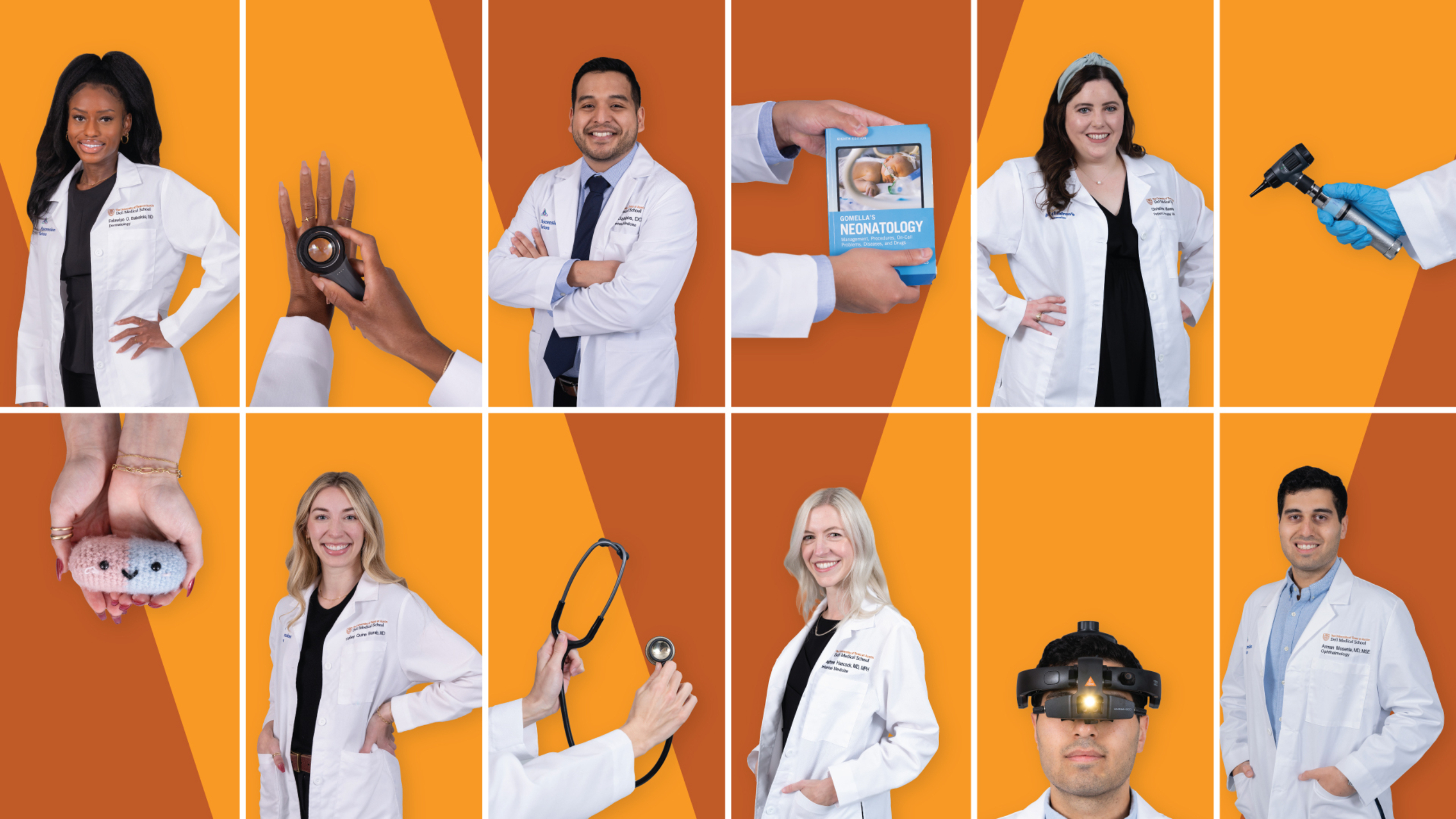
From general surgery to maternal-fetal medicine and more, these physicians in training are honing their skills in their chosen specialties, all the while contributing to more than 560,000 hours of care each year to Austin’s diverse communities. They’ll learn the ins and outs of physician leadership through Dell Med’s unique Advancing Care Transformation curriculum, preparing them to lead change in the health care system and to provide integrated, world-class care focused on one person: the patient.
Meet a few of our newest trainees from these residency and fellowship programs:
It Was Always Dermatology.
It Was Always Dell Med.
Folawiyo Babalola, M.D.
Dermatology Residency
After graduating with a Bachelor of Science and Arts in neuroscience from The University of Texas at Austin in 2017, Folawiyo Babalola, M.D., couldn’t resist the chance to return to the University. Now, as a double Longhorn, she’s fulfilling a lifelong dream of becoming a dermatologist at her alma mater.
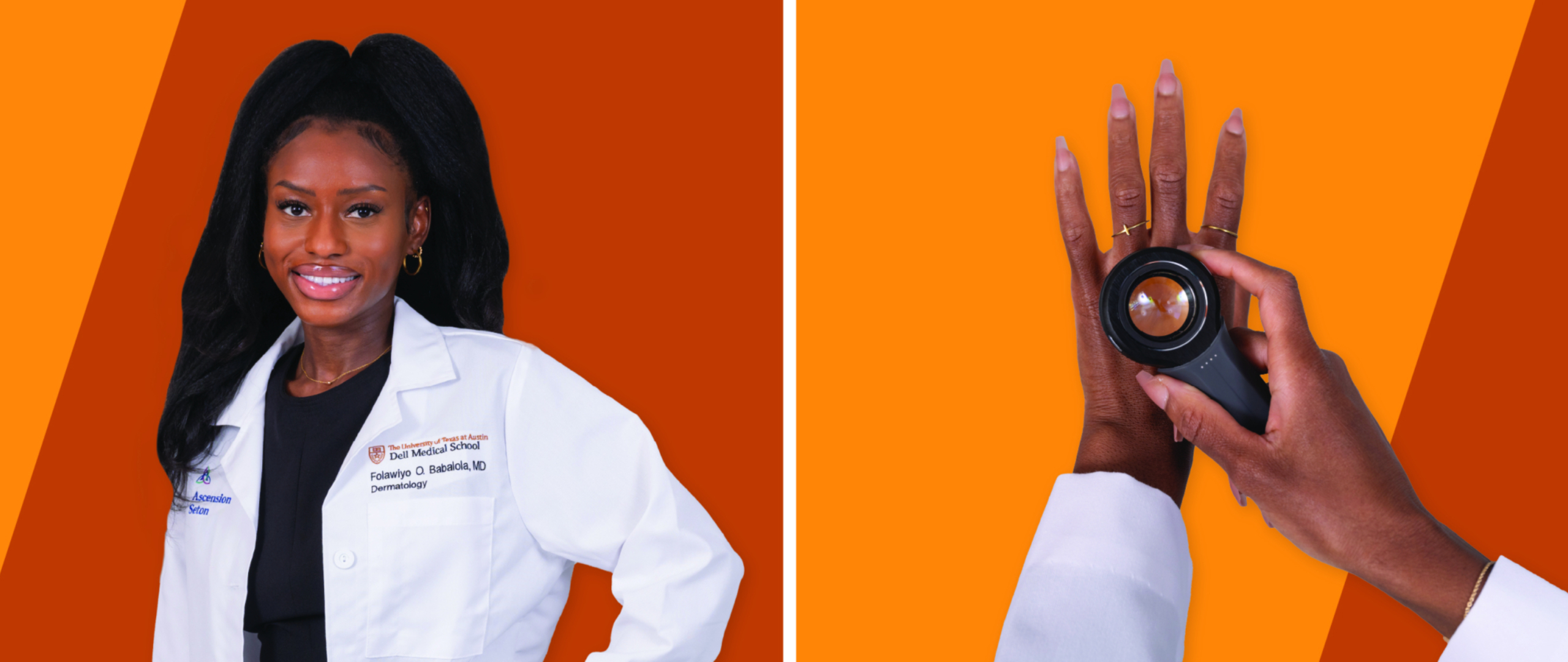
Dermatology first-year resident Folawiyo Babalola, M.D.
When did you first know you wanted to pursue dermatology as a specialty? Why?
Since I was a child — seriously! I’ve always been fascinated with skin. A friend I haven’t seen since middle school recently asked if I fulfilled my dream of becoming a dermatologist and I was so grateful to be able to answer yes.
There are so many reasons I love this field. Dermatology allows me to treat a broad range of pathologies affecting the skin, hair and nails from a diverse patient population. What other field allows you to go from treating nail fungus to injecting spots on the scalp with hair loss to cutting out skin cancers? Dermatology is different from other medical specialties in that most of the time patients and others can see the disease. This can influence patients’ perception of their skin and consequently their self-esteem and self-image. I understand that when patients come into the clinic these are some of their most vulnerable moments. The honor of being able to diagnose and treat them is not one I take lightly and I am grateful for the opportunity to do that within the field of dermatology.
What are your thoughts on residency now that you’re two months in?
The road is easier when you travel it with great people. I’m blessed to have the support of my family, friends, peers and attendings. They have been a constant source of encouragement — from sending text messages to check in and surprise grocery deliveries to sharing funny TikToks when they know I am having a difficult time. I can confidently say I wouldn’t be where I am today without them.
I understand that when patients come into the clinic these are some of their most vulnerable moments. The honor of being able to diagnose and treat them is not one I take lightly.
Folawiyo Babalola, first-year dermatology resident
Combining Passions to Aid Vulnerable Populations
Hailey Barab, D.O.
Psychiatry Residency
Following an audition rotation in adult inpatient psychiatry during her fourth year of medical school, Hailey Barab, D.O., knew Dell Med psychiatry was the program for her. Specifically, she plans to pursue reproductive mental health, a perfect blend of psychiatry and another chief interest of hers — women’s health.
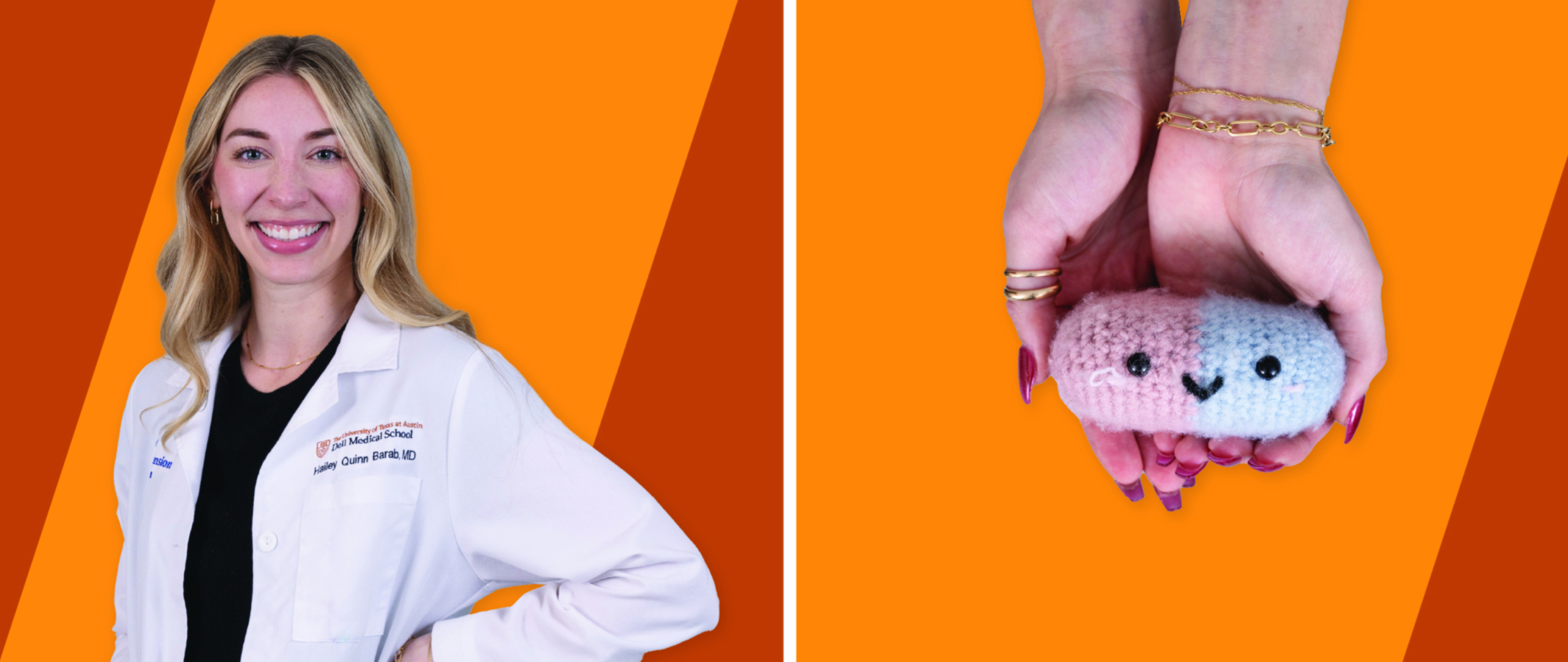
Psychiatry first-year resident Hailey Barab, D.O.
What are you most looking forward to in your psychiatry training?
I hope to learn more about psychiatric illnesses during pregnancy and the postpartum period. I will be exploring these research opportunities with Jeffrey Newport, M.D., M.S. this year. What truly resonates with me in psychiatry is its personal approach — building relationships with some of society’s most vulnerable individuals while understanding their unique psychosocial determinants of health. I’m looking forward to exploring that more.
What is your medical mission?
I am committed to advocating for those with limited access to psychiatric care, providing a tolerant environment where they can find the support they deserve. Central to my practice is understanding the mind-body connection, aiming to unearth and address trauma and empower patients to attain optimal health.
What are you reading, watching or listening to? So much to dig into these days.
I’m currently listening to the Psychiatry & Psychotherapy Podcast hosted by David Puder, M.D. — It offers rich insights into our profession. I’m also a huge reader and I love reading suspense and thrillers. Some of my co-residents and I have started up a book club, so of course we’re reading a thriller for Halloween!
A Pivotal Role, From the Patient’s First Breath
Juan Gallegos, D.O.
Neonatal-Perinatal Fellowship
Taking inspiration from his parents and from community members in the Rio Grande Valley and beyond, Juan Gallegos, D.O., takes his role in babies’ and families’ lives seriously. At the same time, he’s committed to better representation in medicine for Latina/o/x physicians, aiming to fill an important gap for underserved populations.
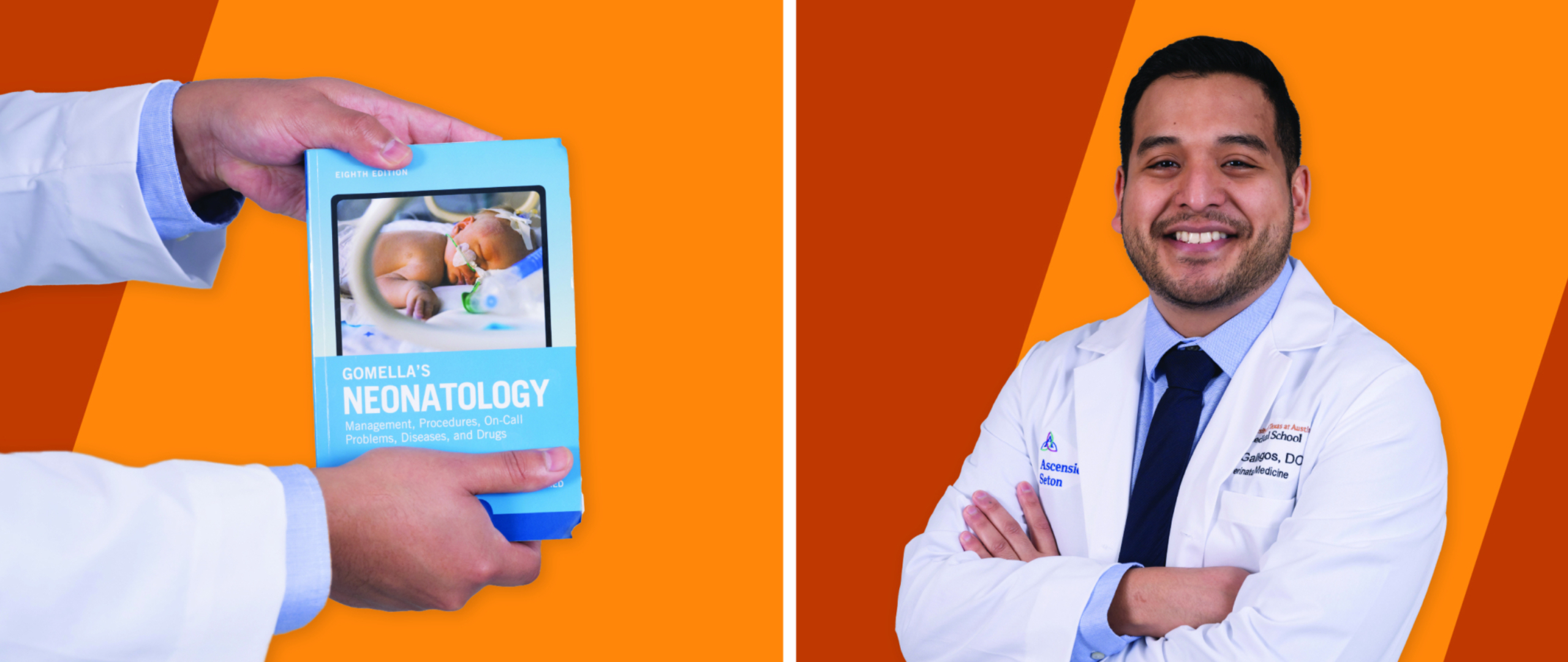
Neonatal-perinatal medicine fellow Juan Gallegos, D.O.
When did you first know you wanted to pursue neonatal-perinatal medicine as a subspecialty? Why?
I knew I was interested in pediatrics when starting medical school partly due to my experiences working with children with special needs while in college. However, my interest in neonatal-perinatal medicine didn’t really unfold until my intern year in residency. Stepping into the neonatal intensive care unit as a resident was definitely daunting, as you find yourself dealing with some of the most fragile patients in the hospital. Although initially intimidating, I fell in love with it. I attribute that love to multiple things, including the pathophysiology affecting neonates, the multidisciplinary efforts to optimize care, the mentors I had in residency, and more importantly the role we play in the lives of each baby and their families.
What drew you to Dell Med?
The people. The neonatal-perinatal program is one of the newer programs at Dell Med, and the excitement I felt from everyone I talked to during my interview was palpable. The people within the program are phenomenal and bring a wide breadth of experiences and expertise that I feel will help shape us into future leaders. They also value a healthy work-life balance, which I find important, especially when working in a high-pressure specialty. I’m excited to be a part of this growing program and am looking forward to what’s to come.
What is your medical mission?
Advocating for marginalized communities has always been one of the primary drivers in my pursuit of a medical career. I grew up in the Rio Grande Valley in South Texas and had first-hand experiences with the challenges medically underrepresented populations may face including language barriers, access to health care, and cultural differences. Although this initially fueled my desire to pursue medicine, in my journey, I worked with so many other communities that have shaped the idea of who I hope to be as a physician. These include working with children with special needs while in college, communities struggling with food insecurity in Appalachia while in medical school, and immigrant families while in residency. These experiences have defined what my medical mission is, which is to be a physician who will advocate for marginalized populations and my patient’s best interests both in the hospital and in the community.
Dell Med, Round Two
Daphne Hancock, M.D., MPH
Internal Medicine Residency
Daphne Hancock, M.D., MPH, was inspired by the compassionate care delivered by residents and faculty members during her time as a medical student at Dell Med. Now she has the opportunity to continue to provide care for and invest in the Austin community as an internal medicine resident.
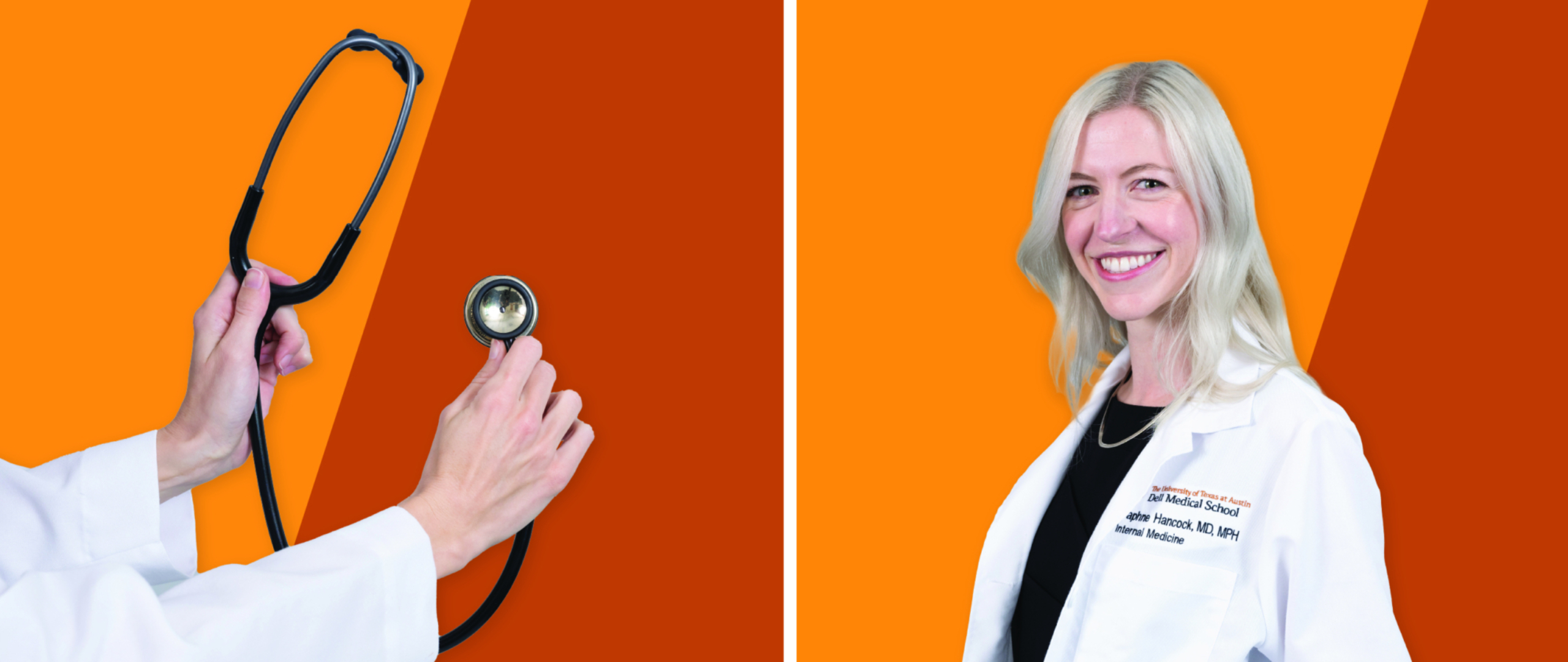
Internal medicine first-year resident Daphne Hancock, M.D.
When did you first know you wanted to pursue internal medicine as a specialty? Why?
Internal medicine offers many opportunities for health education and advocacy. We are often the first point of contact for patients, both in the hospital and in the clinic and this puts us in a unique position to guide patients toward access to the health services they need.
Early on in the pandemic, I saw a Dell Med internal medicine intern take care of an elderly patient with complications from COVID-19. She treated this patient with such care, led family meetings to focus the care on what mattered most to the patient and helped ease the suffering of the patient and her family. That’s what I’m excited to learn through internal medicine. I want to be my patients’ partner in health as we navigate the complex health system together, empower them with knowledge about their health and ultimately help keep them out of the hospital as their primary care physician.
What has surprised you most about residency so far?
One thing that still surprises me every day is how much trust patients place in me as their primary care doctor. I take it very seriously. When I’m with a patient, the clinic room becomes a safe haven. It’s important to me that I create a judgment-free zone. When patients are invited to share their true selves, we can more easily build trust and work together in their journey of health.
When I’m with a patient, the clinic room becomes a safe haven. It’s important to me that I create a judgement-free zone.
Daphne Hancock, first-year internal medicine resident
Leading Change in Complex Care for Kids
Christina Meenan, D.O.
Pediatric Hospital Medicine
A former chief resident at The University of Oklahoma Health Sciences Center, Christina Meenan, D.O., loves the challenge of caring for children with complex needs. Now, she has her sights set on improving that care through research and mentorship.
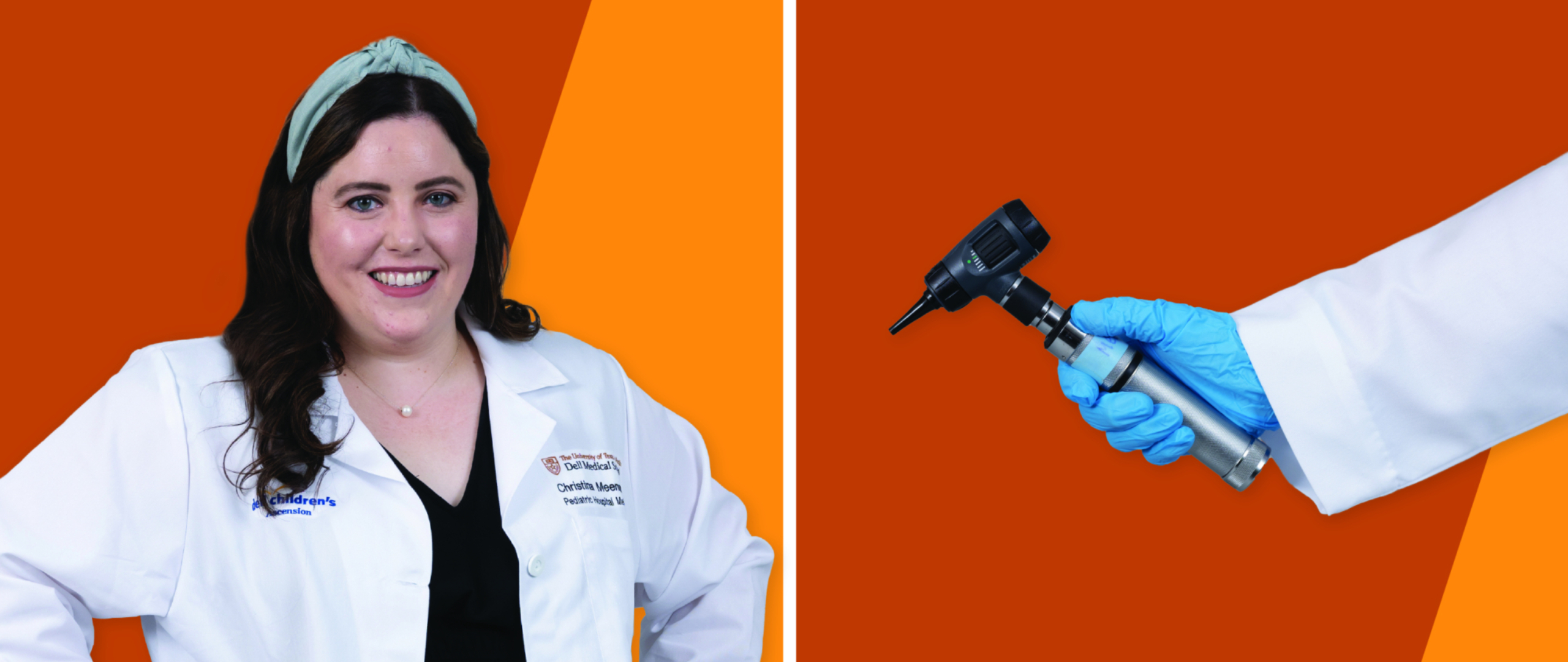
Pediatric hospital medicine fellow Christina Meenan, D.O.
Why pediatric hospital medicine?
As a resident spending many hours in the hospital, I was drawn toward gastroenterology, pediatric hospital medicine and the pediatric intensive care unit. I loved the procedures in gastroenterology and the acuity and rush of adrenaline in the PICU, but pediatric hospital medicine was the best of both worlds, and I decided to pursue this subspecialty in my third year after lots of self-reflection. I love that I have the opportunity to work with an interdisciplinary team to ensure an evidence-based and value-conscious approach to the hospital stay and that I get to form relationships with patients and their families.
Now that you’re here, what are you most looking forward to in this experience?
I’m excited to have more time dedicated to research, mentorship and professional development. As a chief resident, I had the opportunity to develop longitudinal curricula for residents based on my experiences as a resident. Now, I am lucky to be a part of this fellowship to undergo formal teaching about adult learning and proper curriculum development.
The path to medicine is long and challenging. What, or who, has been your greatest inspiration along the way?
My youngest sister had chronic health issues growing up, and for the longest time, the excellent care (and even the subpar care) she received inspired me to be a well-rounded, thoughtful, caring physician. As I’ve gotten older, I’ve been more involved in my parents’ and grandmother’s health issues, which have reminded me of what is important when taking care of patients: the patient. Going to the hospital and doctor’s appointments as a family member of a patient, rather than a doctor, has given me insight into how I can improve my own patient relationships. I find myself spending more time in rooms with patients and their family members explaining testing results, the treatment plan and anticipatory guidance for when they return home. I’ve been challenging myself to pause amid the busy workday and allow families space to ask questions.
Seeing the Potential in a New Program
Arman Mosenia, M.D.
Ophthalmology Residency
As part of Dell Med’s inaugural class of ophthalmology residents, Arman Mosenia, M.D., is learning to improve his patients’ ability to experience the world through better vision. This, plus the program’s fresh, forward-thinking culture is what drew him here. And to Mosenia, it’s all so exciting.
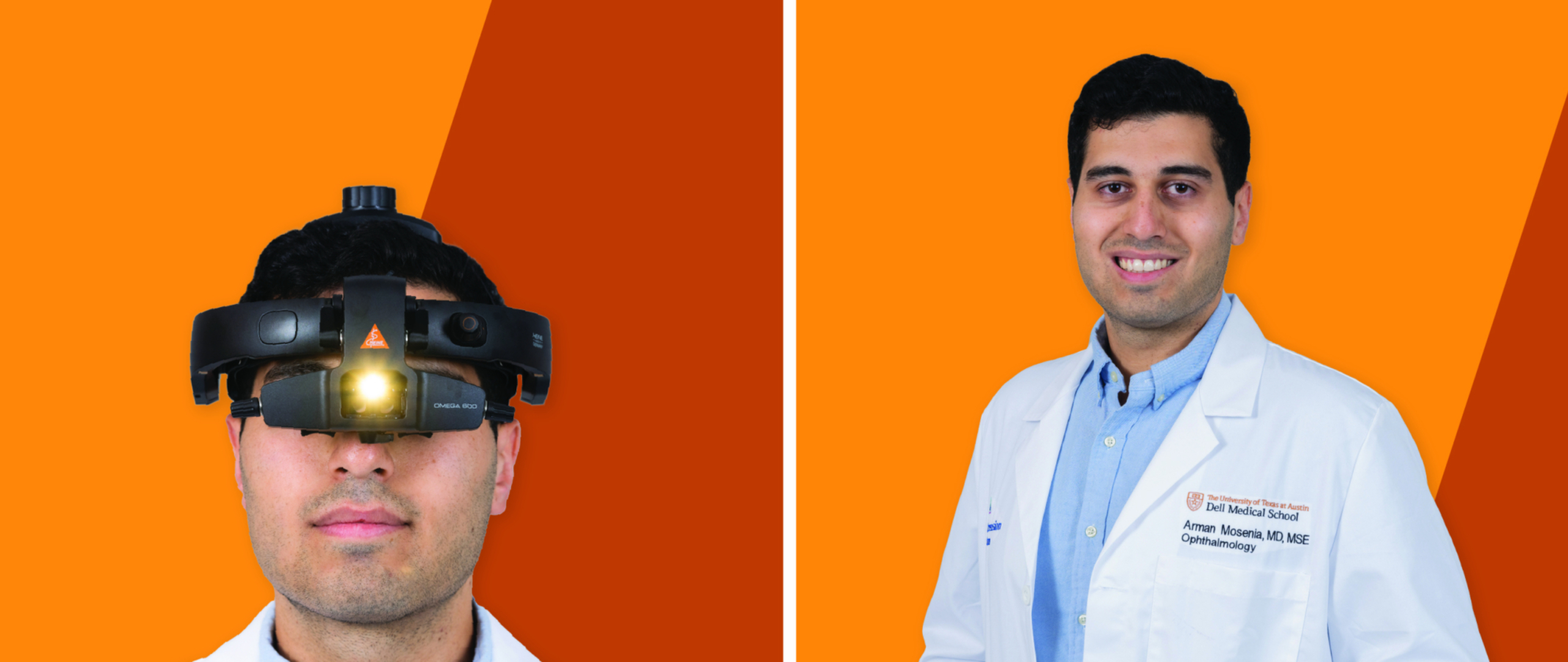
Ophthalmology second-year resident Arman Mosenia, M.D.
While it’s your first year in ophthalmology, you’ve already completed one year of residency. Tell us about your transitional year experience and how it prepared you for ophtho.
The transitional year was a great balance of hard work, learning and personal growth. It offered exposure to a wide range of specialties. Whether it was managing the demanding workload of a busy service like trauma, providing overnight care in the intensive care unit or devising a safe discharge plan for a patient with housing insecurity during my internal medicine rotation — the transitional year laid a robust foundation for my ophthalmology residency. When I am on call, having these experiences and having worked with many residents and faculty members from various specialties makes it easier to provide interdisciplinary care for complex patients.
What is your medical mission?
I aim to make a tangible impact on my patients by using my surgical skills and clinical knowledge to improve their vision and overall eye health. But it’s not just about the medical side of things; I want to understand each patient’s unique journey, offer support and provide them with the knowledge they need to heal and thrive.
Additionally, I’m committed to merging my passion for patient care with my background and interest in health innovation. I see myself working on the development of cutting-edge medical technologies that can not only enhance how we deliver care but also lead to better outcomes for patients on a larger scale. It’s an exciting journey ahead, and I’m eager to make a meaningful contribution to the world of ophthalmology.
Two months down. What are your initial takeaways from residency?
Many compare the first year of ophthalmology residency to drinking from a fire hose! They are not kidding. The learning curve has been steep, but despite working long hours and navigating numerous new situations, it has been incredibly rewarding. The best part is the strong bond and camaraderie among our residency class and our amazing faculty and staff, which have also made it a lot of fun. Every day, I am excited to continue growing and learning in this environment as I progress in my residency.
Graduate medical education, or GME, refers to the period of education in a particular specialty or subspecialty following completion of medical school. This continuation of training through residency and fellowship programs provides the clinical and educational experience needed for physicians to achieve autonomy, deliver high-quality patient care, and prepare for challenges in an evolving health care landscape.
Dell Med serves as the academic home and Ascension Seton as the clinical home for 494 resident and fellow physicians within more than 45 residency and fellowship programs ranging from family medicine and neurology to pediatric emergency medicine and cardiovascular disease.